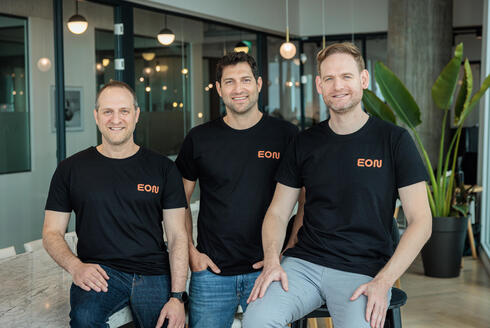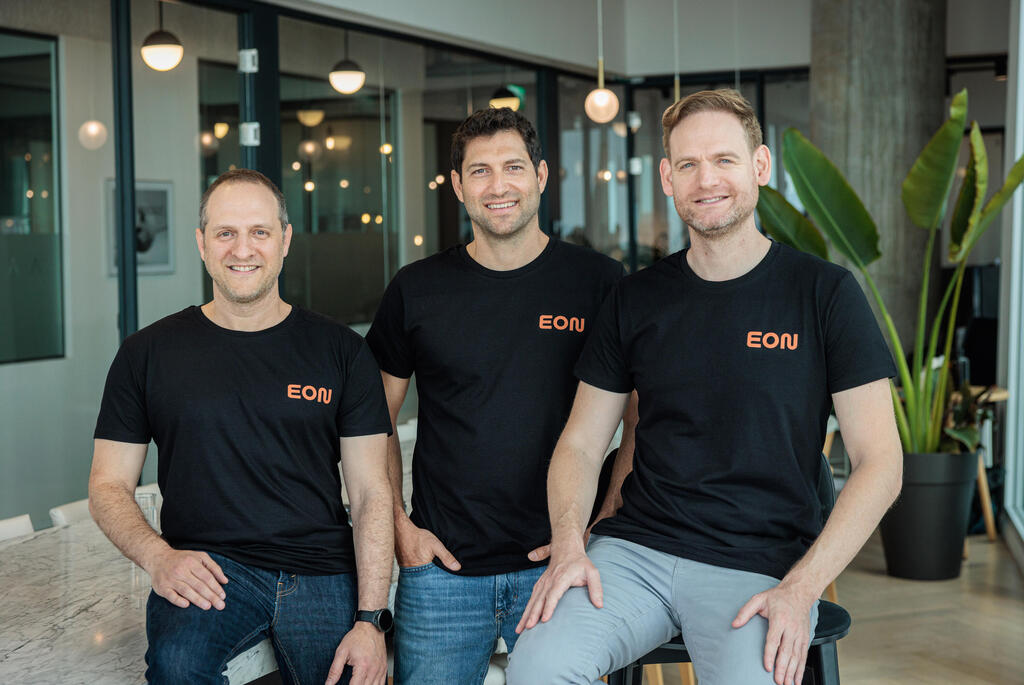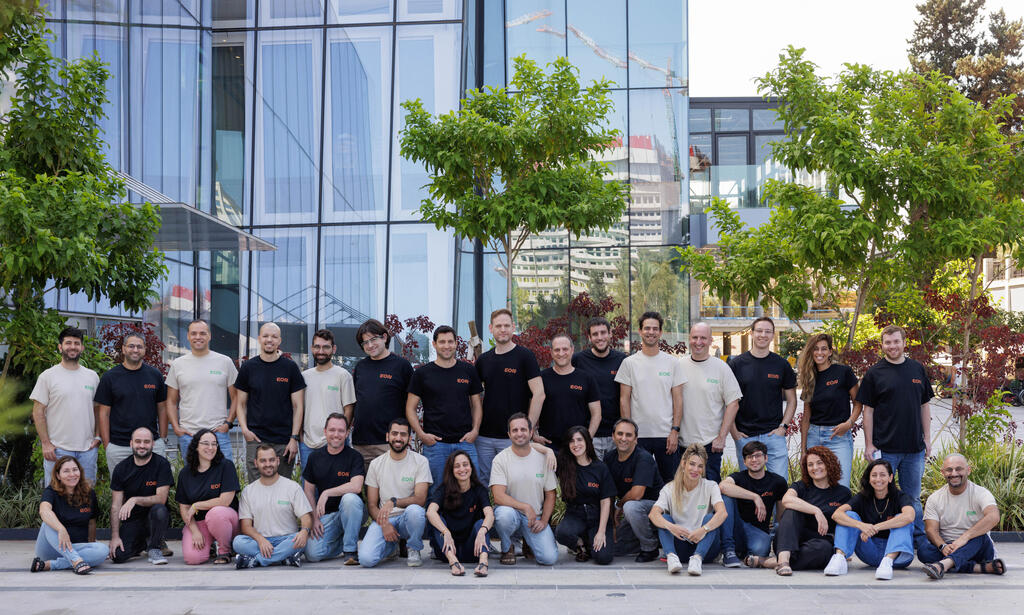
The next Wiz? Eon raises $77M at $750M valuation before product launch
The Israeli startup, which is developing a cloud-native data recovery system, has raised a total of $127 million in less than a year.
The Israeli startup Eon is the most talked-about secret in the high-tech industry of 2024. Founded only at the beginning of the year amidst the ongoing war, the company has become a magnet for some of the brightest names in Silicon Valley, successfully securing funding three times already. The most recent funding round, which revealed the cloud backup solutions startup, was completed just a few weeks ago, with an estimated valuation of $750 million. Eon currently has no income, as product development has yet to be completed, and it employs only 36 people.
In an exclusive first interview marking Eon's exit from stealth mode, it is evident that even the three founders—Ofir Ehrlich, Ron Kimchi, and Gonen Stein—are surprised by the rapid pace of events, which are progressing much faster than anticipated. This, despite the fact that all three founders are in their 40s, with families, and for Ehrlich and Stein, this is not their first startup.
"To this day, we still haven't had time to prepare a presentation for investors," they laugh. "We knew we had the right idea at the right time, but we didn’t expect what happened. We started the company in December 2023 and didn’t even think about doing a funding round. We assumed that, because of the war and the fact that Americans usually take it easy in December and early January, it would be better to wait. We wanted to have a big funding round, and the timing didn’t seem good due to the war. We planned to begin recruiting in the first or second quarter of 2024, but by then we had already closed our first funding round," says Ehrlich.
How did it happen?
"Since I know a lot of investors, I started consulting with them and discussing the company. As a result, many offers came in—dozens, in fact. I was very surprised; apparently, we were able to tell a compelling story because we know the field well. We decided in advance to limit ourselves to funds that understand what Israel is about, especially during a time like this."
From the limited information that has leaked so far about Eon, it’s clear that this is an unusual event reminiscent of Wiz—experienced founders who have previously sold a company to a tech giant and learned how the market works, enabling them to create a more ambitious venture. The first fundraising round for Eon, which occurred even before the founders considered it, was for $20 million led by Sequoia Capital, with Shaun Maguire as the responsible partner, and included participation from Vine Ventures, Eight Roads, and Meron Capital. About a month later, another round raised $30 million, led by Lightspeed and joined by Omri Casspi's Sheva, who became the largest Israeli investor in the company. This second round valued Eon at $215 million. The last round, a Series B completed a few weeks ago, was led by Greenoaks, with participation from Quiet Ventures. This round was remarkable for a company less than a year old, raising $77 million at a valuation of $750 million. Thus, since it began operations amidst the war, Eon has raised $127 million in less than a year, even before launching a product, while employing only 36 employees split between its offices in the U.S. and at Azrieli Sharona in Tel Aviv. Ehrlich and Kimchi are based in Israel, managing the development center, while Stein, who is focused on business development, resides in New York.
Why keep the shroud of secrecy if so many investors have already entered the company, and there is significant buzz around it?
"We wanted to ensure we understood our messages well enough before they reached the public unevenly or forced us to change direction. We didn’t seek secrecy; we talked to many people about the product. However, we also took advantage of the relative quiet to work. During this time, we registered hundreds of patents in the world of backup and storage."
At this rate, I should ask if you are already preparing for a fourth funding round?
"We understand that the latest valuation is quite high; we remember 2021, and I recall it as an investor. That's why, even in the third funding round, we didn’t accept all the offers we received; we didn’t want things to get out of hand and wanted to act responsibly. It was only after we saw reactions from organizations regarding our product—which showed us they genuinely needed it and intended to buy—that I felt we could raise more money," Ehrlich explains. "We work quickly, with a lot of knowledge brought by a team of 8-9 employees who joined Eon from our previous company, CloudEndure, which was sold to AWS. Though we don’t have sales yet, we already have initial customers and are in discussions with more than 100 companies. You could say we've condensed years of work into the last nine months. We know it’s hard to ignore the similarities between us and Wiz, but we don't want to rush. We won't recruit a thousand employees now; we believe in small, efficient teams. As soon as the teams grow, it becomes more challenging to maintain the same quality, so despite the substantial capital raises and great interest in the company, we are only adding 10 more engineers."
The driving force behind both CloudEndure and Eon is Ehrlich. True to the archetype of the Israeli entrepreneur, he is a computer geek who started programming at the age of 9 and enlisted in 8200. Shortly before recruitment, he happened to meet Stein, who was a friend’s partner, and since then, they have become best friends. Together, they founded CloudEndure in 2013. For Ehrlich, this was his third and most successful startup: the company developed technology that enables organizations to move quickly without losing data and to establish infrastructure for rapid recovery against data loss. It raised only $18 million, was profitable almost from the start with an annual revenue of about $20 million, and was sold to AWS, Amazon's cloud division, for $200 million. It was in 2019 that Ehrlich and Stein met Kimchi, who joined AWS in Israel as the General Manager of Disaster Recovery and Cloud Migration.
Stein and Ehrlich are serial entrepreneurs who didn't have time to pursue academic degrees, while Kimchi followed a more traditional path, completing his studies in mathematics and computer science after serving in the IDF’s elite Shaldag unit. After nearly five years at Amazon, the trio left to found Eon. Along the way, Ehrlich, who has become an active angel investor with investments in 30 companies, almost transitioned to a venture capital career but ultimately decided he had not yet exhausted his entrepreneurial ambitions. "It was clear to me that with our current team and at this moment in the cloud market, I had to do it one more time. I saw many companies in the meantime as an investor, which provided me with valuable insights. I felt I was starting to understand this world much better."
The name Eon signifies a long era in history, hinting at the vast market the three founders identified in the field of data backup in the cloud and beyond.
"Eon is one level below 'Eternity.' It is very appropriate because we preserve data for a long time. There is no intentional use of the terms 'backup' or 'cloud,' allowing us a great deal of mental flexibility," Ehrlich explains. The founders of Eon and their investors are not the only ones who see potential in this space, as evidenced by the recent sale of Own, which also operates in this market, to Salesforce for $2 billion.
Similar to the founders of Wiz, who experienced the transition challenges while working at Microsoft after selling their first company, Adallom, Ehrlich, Stein, and Kimchi witnessed the difficulties organizations face in moving to the cloud. "The processes are very disorganized, both during the transition to the cloud and in managing cloud backups," Ehrlich and his partners explain. "Data is the most important asset in an organization. I initially assumed that backing up data was a problem that had been completely solved, but I discovered that this is far from reality. We had a large client at AWS that was the target of a ransomware attack. We assumed that once the incident was resolved, there would be no dramatic consequences because the data was being backed up. Surprisingly, the outcome was grim, as different people in the organization transferred applications to the cloud without a centrally organized plan and without adequate control over the process in each department. Everyone assumed that the cloud handled everything. The key phrase here is 'shared responsibility': the cloud companies provide the infrastructure, but the customer—the organization itself—is responsible for the rest. So when a company moves applications to the cloud, they are often not well protected. The onus is on the company. Only in recent years have organizations started building organized cloud management departments, and Eon's product is designed for them," the company explains.
The uniqueness of Eon, similar to Wiz, is that it is one of the few backup and data recovery companies that were conceived specifically for the cloud era. It also capitalizes on the panic surrounding the rush to the cloud, which sometimes comes at the expense of an orderly and organized process, leading to a loss of control over event management within organizations.
"Large, established organizations have really moved to the cloud in the last three years, revealing significant gaps in their backup strategies. That's why between 10% and 20% of cloud spending today goes to backup," explains Eon. "If you consider that the cloud infrastructure market is growing rapidly—from $247 billion at the end of 2023 to $300 billion today—we understand the magnitude of the opportunity."
If this is such a big problem, why hasn't it been solved until now, or at least why are there so few competitors working on a solution?
"All the companies in this field were born in the old world of servers, and they simply started moving their boxes to the data center. You can't just take a square and fit it into a circle; you have to develop the product according to how the cloud operates. Currently, we primarily see Rubrik as competition, which went public this year at a valuation of $5.6 billion, along with American firm Cohesity."
Right now, it sounds ambitious, but your investors must have set hard goals. What are they?
"Our goal is to build a large, billion-dollar company. It's challenging, not trivial, but we have an opportunity to achieve this because the market is favorable. Talking about an IPO at this stage is naive, as we are still very early in our journey. While valuation is an interesting derivative of the company's situation, it is ultimately measured at the end, not at intermediate points. Right now, we want to focus on product adoption and the revenues that will follow."
















